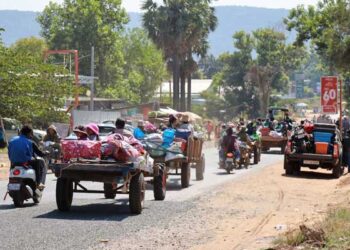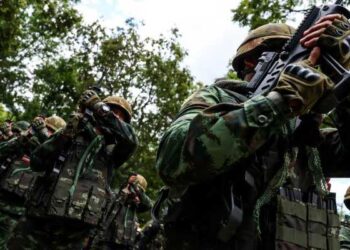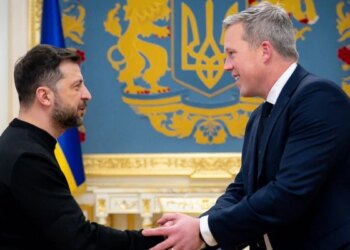Select Language:
- Regaining control of the palace represents a symbolic win for the army.
- The ongoing conflict has triggered the world’s largest humanitarian crisis.
- The RSF is solidifying its hold in the western regions and establishing its own government.
The Sudanese army announced on Friday that it has regained complete control of the presidential palace located in downtown Khartoum, marking a significant shift in the ongoing two-year conflict with a rival armed faction that poses a threat to the country’s unity.
In response, the paramilitary Rapid Support Forces (RSF) stated that they remain close to the palace and claimed to have launched an attack that resulted in the deaths of numerous army personnel within the palace.
According to army sources, the RSF fighters are positioned approximately 400 meters away. Reports indicate that the army faced a drone strike that resulted in several casualties, including three journalists from state television.
While the army had been on the defensive for an extended period, recent developments indicate that they are regaining ground, having reclaimed territory from the RSF in central areas of the country.
On the other hand, the RSF has been fortifying its presence in western Sudan, establishing new defensive positions and steering the country toward a potential partition. They are also attempting to form a parallel government in the regions they control, although international acceptance of this administration remains unlikely.
The RSF initially took control of the presidential palace and the rest of Khartoum shortly after the outbreak of hostilities in April 2023, a conflict sparked by tensions over integrating the paramilitary organization into the national armed forces.
Videos shared by the army depicted soldiers celebrating on the palace grounds, where shattered glass and bullet-scarred walls highlighted the intensity of the conflict.
Many citizens in Sudan expressed support for the army’s declaration of control over the palace. “The recovery of the palace is the best news I’ve received since the war began, as it signals the army’s reclaiming of the rest of Khartoum,” stated 55-year-old resident Mohamed Ibrahim.
“We want to feel safe again and live without fear or hunger,” he added.
On Thursday evening, the RSF announced that they had captured a strategic military base from the army in North Darfur, a region in the western part of the country.
The conflict has escalated into what the UN describes as the largest humanitarian crisis in the world, leading to widespread famine and disease among the 50 million inhabitants of Sudan.
Both factions have faced accusations of committing war crimes, with the RSF specifically being charged with genocide, which both groups deny.
Gunfire Echoes in Khartoum
On Friday, sporadic gunfire was reported in Khartoum, and further violent clashes are anticipated as the army aims to encircle the RSF, which still controls extensive territories south of the palace.
Earlier this week, RSF leader Mohamed Hamdan Dagalo, known as Hemedti, had directed his troops to maintain their positions at the palace.
Although the RSF retains a presence in Khartoum, its grip is reportedly weaker than at any time since the conflict erupted, suggesting a potential complete withdrawal of the RSF, according to Ahmed Soliman, a senior research fellow at Chatham House.
The army is likely to continue military operations in the western regions, resulting in a “contested, partitioned reality” for Sudan, he added.
The war broke out two years ago, as the country was initiating a transition toward democratic governance.
Following the ousting of Omar al-Bashir in 2019, the army and RSF had previously joined forces but later became adversaries, largely due to historical grievances where Bashir bolstered the RSF as a counterbalance to the army, which is led by career officer Abdel Fattah al-Burhan.







